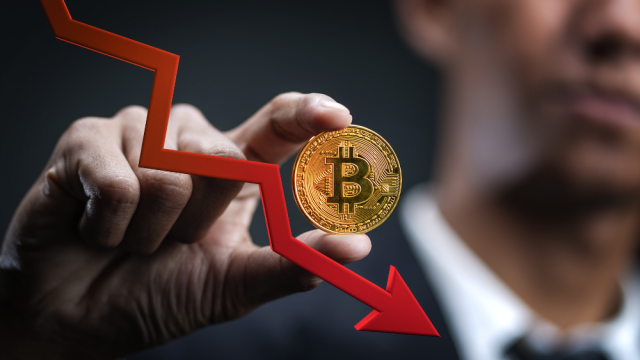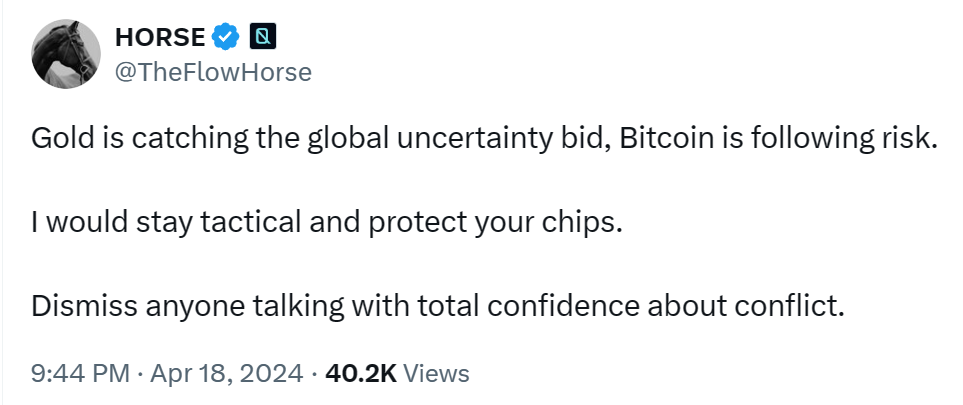What Are The Reasons Behind The Decline In Bitcoin (Btc) Price?
- Posted on April 30, 2024 10:44 PM
- Cryipto News
- 873 Views
The price of Bitcoin has fallen today due to factors such as withdrawals from spot BTC ETFs, the arrest of the founders of Samourai Wallets, and deteriorating macroeconomic conditions negatively impacting investor sentiment.

Over the past five days, the price of Bitcoin has decreased by 7%, falling to $61,795 on April 29. It then experienced a slight recovery, rising to $62,900, but concerns have been raised as Bitcoin has not reached its all-time high of $73,757 for more than six weeks. This situation can be linked to a decrease in investor interest in cryptocurrencies, and various events such as the arrest of the founders of Samourai Wallet may have also played a role.
Weaknesses are being observed in Bitcoin ETFs and miner revenues. On April 24, the leading figures of this privacy-focused wallet, which features cryptocurrency mixing capabilities, were charged by the U.S. Department of Justice and other agencies with money laundering and operating an unlicensed money transmitting business. Court documents reveal that the company facilitated illegal transactions, earning over $4.5 million in fees.
Other factors contributing to the price drop of Bitcoin on April 29 include increasing recession risks in the U.S., lack of inflows into spot Bitcoin ETFs, and concerns about the profitability of BTC miners following the halving event. Initially, these challenges were somewhat mitigated by an increase in blockchain area inscriptions, a growing trend in the blockchain field.
Some analysts believe that Bitcoin's failure to capitalize on escalating tensions in the Middle East is a significant reason for the lack of investor interest. Meanwhile, precious metals like gold are trading just 2.3% below their record closing price of $2,392 on April 22, making it challenging for Bitcoin to serve as a hedging tool.

In a social media post on platform X, the trader and influencer known as "The Flow Horse" mentioned that gold prices have risen in response to conflicts in the Middle East, but Bitcoin prices have fallen due to its association with risky investments. Although many analysts claim that Bitcoin is designed to perform well in tough times, they noted that its price is not solely determined by its owners or fundamental functions.
Bitcoin fails to protect investors from uncertainty. With the Federal Reserve expected to keep interest rates above 5% for longer than previously anticipated, concerns about a global recession are increasing. Esther George, former president of the Kansas City Fed, stated that rate cuts would require "quite dramatic confirmation" of an economic slowdown. She also mentioned that the Fed might delay its actions until 2025 due to the national presidential elections in November.
The slowing economy does not prevent companies from making record profits in the first quarter. According to a report by FactSet, 77% of S&P 500 companies are experiencing positive earnings surprises. Therefore, the diminished appetite for Bitcoin could partly be attributed to the positive earnings expectations for Amazon on April 30 and Apple on May 2.
Bitcoin bulls argue that if central banks decide to intervene, the second half of 2024 could either see global economies entering a recession or inflation strengthening. However, even if this hypothesis proves true, it indicates that companies within the S&P 500 might seek protection considering their profit-making capacity and the $6.9 trillion in assets held by non-banking firms. Ultimately, as stocks compete for a share of reserve assets, they may trade at much higher multiples historically.
Additionally, on May 1, the U.S. Treasury is expected to restart its bond buyback program for the first time in over 20 years. The purpose of the program is to support liquidity following Japan's currency intervention, one of the largest holders of U.S. Treasury bonds. Consequently, investors remain uncertain if Bitcoin's price will hold if macroeconomic conditions worsen.
For the latest developments and news in the cryptocurrency markets, you can follow real-time updates at Kriptospot.com.

